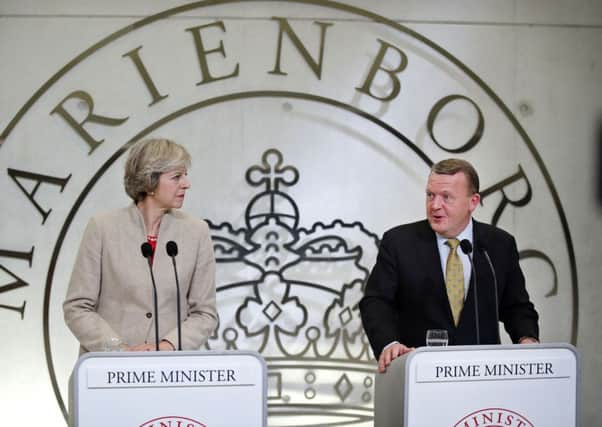Brexit Secretary says departure from the EU won't be held up


The Haltemprice and Howden MP made clear the Government will not yield to growing pressure to guarantee the Commons a vote on the deal agreed with Brussels over the terms of Britain’s departure.
However he hinted that MPs may get a say if the two years of talks with Brussels ends with a new treaty between Britain and the remaining 27 EU countries.
Advertisement
Hide AdAdvertisement
Hide AdTheresa May yesterday promised Britain would make a “smooth and orderly departure” from the EU during a visit to Denmark.
The pressure on the Government to give the Commons a say grew following the intervention of Leave-supporting Conservative backbencher Stephen Phillips who argued pushing a Brexit deal through without parliamentary approval would amount to “tyranny”.
The Sleaford and North Hykeham MP was given permission by Commons Speaker John Bercow to seek MPs’ backing for an urgent debate on the issue today.
In a letter to the Speaker, Mr Phillips said that bypassing Parliament was “simply not an acceptable way for the executive to proceed”, adding: “I and many others did not exercise our vote in the referendum so as to restore the sovereignty of this Parliament only to see what we regarded as the tyranny of the European Union replaced by that of a Government that apparently wishes to ignore the views of the House on the most important issue facing the nation.”
Advertisement
Hide AdAdvertisement
Hide AdSpeaking in the Commons, Mr Davis told MPs: “The referendum was backed by six to one in this House, and on all sides of the argument, Leave and Remain, we have a duty to respect and carry out the people’s instruction.
“As I have said, the mandate is clear, and we will reject any attempt to undo the referendum result, any attempt to hold up the process unduly, or any attempt to keep Britain in the EU by the back door by those who didn’t like the answer given on June 23.”
He appeared to indicate that the Commons will be offered a vote if the two-year negotiations end with a new treaty with the other 27 EU states, telling MPs: “Naturally I want this House to be engaged throughout, and we will observe the constitutional and legal precedents that apply to any new treaty on a new relationship with the EU. Indeed, my whole approach is about empowering this place.”
Mr Davis said that a Great Repeal Bill to scrap the 1972 Act which took Britain into what was then the European Economic Community would be tabled in the next parliamentary session, which begins in May 2017. The Bill will transpose all relevant EU law into the domestic statute book, so that it can then be amended or repealed by Parliament where necessary.
Advertisement
Hide AdAdvertisement
Hide AdBut the shadow Brexit secretary demanded a vote before Mrs May invokes Article 50, which she has said she will do before the end of March 2017.
“It seems the Government wants to draw up negotiating terms, negotiate and reach a deal without any parliamentary approval,” said Sir Keir in response to Mr Davis’ statement.
“That is not making Parliament sovereign. That is sidelining Parliament.”
Sheffield Hallam MP Nick Clegg, the Lib Dems’ Brexit spokesman, said: “David Davis has always been a staunch defender of parliamentary sovereignty, and even tabled his own Bill on the Parliamentary Control of the Executive in 1999.
“He needs to explain why he suddenly believes the government can vandalise the economy by hauling us out of the Single Market without even asking Parliament for the authority to do so.”